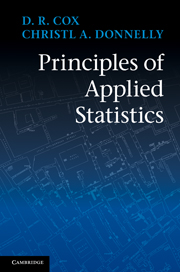1 - Some general concepts
Published online by Cambridge University Press: 07 September 2011
Summary
An ideal sequence is defined specifying the progression of an investigation from the conception of one or more research questions to the drawing of conclusions. The role of statistical analysis is outlined for design, measurement, analysis and interpretation.
Preliminaries
This short chapter gives a general account of the issues to be discussed in the book, namely those connected with situations in which appreciable unexplained and haphazard variation is present. We outline in idealized form the main phases of this kind of scientific investigation and the stages of statistical analysis likely to be needed.
It would be arid to attempt a precise definition of statistical analysis as contrasted with other forms of analysis. The need for statistical analysis typically arises from the presence of unexplained and haphazard variation. Such variability may be some combination of natural variability and measurement or other error. The former is potentially of intrinsic interest whereas the latter is in principle just a nuisance, although it may need careful consideration owing to its potential effect on the interpretation of results.
Illustration: Variability and error The fact that features of biological organisms vary between nominally similar individuals may, as in studies of inheritance, be a crucial part of the phenomenon being studied. That, say, repeated measurements of the height of the same individual very erratically is not of intrinsic interest although it may under some circumstances need consideration. […]
Information
- Type
- Chapter
- Information
- Principles of Applied Statistics , pp. 1 - 13Publisher: Cambridge University PressPrint publication year: 2011
